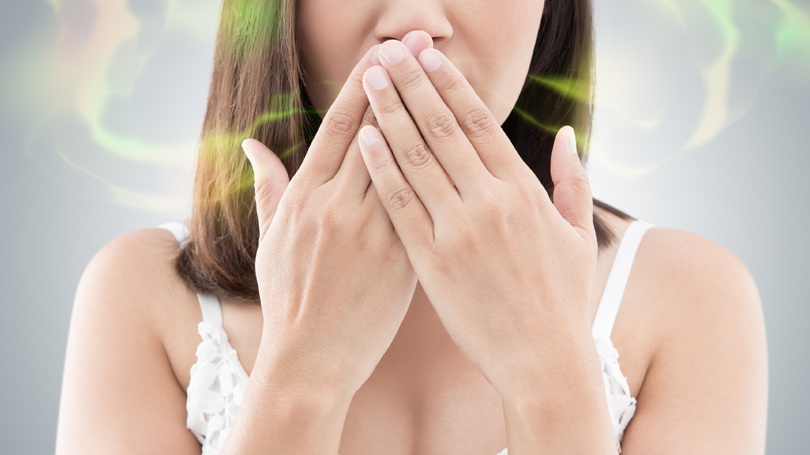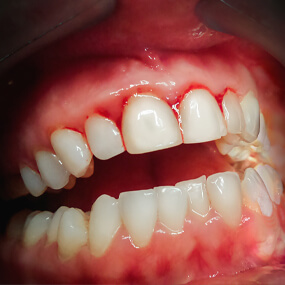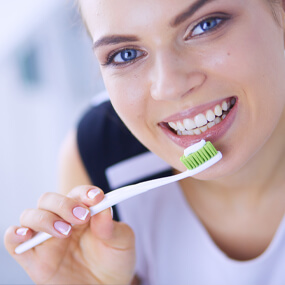Why Bad Breath Happens and What You Can Do About It

Occasional bad breath is a fact of life, but it can be downright embarrassing. You may be unaware that you even have bad breath until you find yourself in an awkward social situation. Understanding what causes bad breath can help you avoid it, and if the halitosis is chronic, you can then go to your dentist to have the underlying cause diagnosed. For most people, avoiding bad breath is rather simple.
According to the American Dental Association, the most common causes of bad breath are:
- Food: After a meal or snack, food particles remain in your mouth and can cause bad odors due to the development of bacteria. There are also certain pungent foods—garlic and onions, for instance—that are digested, absorbed into the blood, and then delivered to the lungs. This is why garlic is notorious for being able to give a person bad breath long after a meal has been enjoyed.
- Dry mouth: Saliva serves a crucial function in your mouth: it washes away food particles and bacteria. If your mouth is dry, then there is not enough saliva to do the job. The bacteria accumulation then causes bad breath. Dry mouth can be occasional, chronic, and even caused by certain medications.
- Tobacco: Smoking, as well as chewing and dipping tobacco, creates a distinct odor. Smokers often become nose-blind to these smells, but they are quite off-putting to non-smokers. Bad breath isn’t even the worse part. It goes without saying that smoking puts you at much greater risk of cancer.
- Poor oral hygiene: Brushing your teeth and gums, cleaning your tongue, and flossing are essential to good oral health and help to avoid bad breath. When you skip these activities, food particles remain and break down into bacteria that can create foul odors. That bacteria will eventually lead to gum disease, and gum disease is among the leading causes of chronic halitosis.
- Medical conditions: There are some major health conditions that can cause chronic bad breath, including diabetes, kidney disease, and some liver diseases. There are also conditions that can be relatively minor and cause bad breath, such as respiratory inflammation and infections.
The Steps to Avoid Bad Breath
- Brush your teeth and gums twice a day. The ADA recommends once in the morning after breakfast and again before you go to sleep. You should use a fluoride toothpaste that has the ADA Seal of Acceptance, and brush your teeth and gums totally for about two minutes. You may want to use a baking soda toothpaste on occasion to reduce acidity levels in the mouth, and there are products on the market that have the ADA seal and combine baking soda with fluoride, along with other helpful agents.
- Rinse regularly. The ADA recommends using a non-alcohol therapeutic mouthwash once a day. In addition, after lunch or a snack, you can rinse vigorously with water to remove food particles. As a breath freshener, you can add a non-acidic natural oil, or you can chew sugar-free gum in order to promote saliva flow. Note that over-using mouthwashes or using the wrong products can actually worsen bad breath by irritating oral tissues.
- Floss daily. According to the ADA, you only need to floss once a day because it takes bacteria about 24 hours to become plaque. Flossing removes food particles you cannot get to by brushing alone, and so if you don’t floss, it can cause bad breath even if you otherwise practice good oral hygiene. Flossing more on occasion to get stuck food is all right, but it is possible to floss too much and hurt your gums, so take care.
- Scrape or brush your tongue. Skipping the tongue is probably the most common mistake people make. Bacteria builds up on the tongue just as it does on the teeth and gums. You can use your toothbrush while brushing your teeth and gums to also remove that residue from your tongue. You might also consider a tongue scraper, which is an inexpensive but effective tool for tongue cleaning.
- Stay hydrated. Being well-hydrated is important for your overall health. It also helps to avoid dry mouth and promote saliva production, and it washes away food particles and bacteria on its own as well. How much should you drink? It depends. Note that the oft-repeated 8×8 rule is not backed by science. You do not have to follow a specific rule. If water is your main beverage and you limit the intake of sugary and acidic drinks, you should be fine. For a more personalized answer, consult with your doctor. If you experience chronic dry mouth, consult with your dentist about using an over-the-counter remedy.
- Adjust your diet with your oral health in mind. Limit sugars and acids as much as possible. Avoid snacks that can stick to your teeth and cause the bacteria that fosters bad breath and gingivitis. Cheeses and milk are an effective way to neutralize acids. Crunchy fruits and vegetables are nutritious snacks that can clean your teeth, freshen your breath and exercise your jaw and teeth in a healthy way. As a water alternative, black and green teas are a good option that actually help combat bad breath.
- Clean your dental appliances. Sanitize your toothbrush or brush head on a weekly basis. Replace your toothbrush or brush head after three months or as soon as it starts to fray. If you use a retainer, denture, or some other dental appliance, clean it before putting it in your mouth as well as overnight.
- Quit using tobacco products. Bad breath doesn’t rank at the top of the reasons to quit smoking, but if you need another reason, here it is. Smoking not only creates bad breath on its own but dries out the mouth, and it pervades your hair and clothes to create some really overpowering odors.
- Schedule regular dental visits. Even if your teeth and gums are perfectly healthy, you should see your dentist twice a year. Your dentist or dental hygienist will clean your teeth and gums of any plaque you missed—and you will miss some. Your dentist can then inspect your mouth for any signs of gingivitis or decay. If you are experiencing chronic bad breath, your dentist will either be able to diagnose the underlying cause or will be able to refer you to a medical specialist who can make that final diagnosis.
Ensure Fresh Breath and Make Great First Impressions
Bad breath happens to us all on occasion. But if you are consistent with your oral hygiene at home and visit your dentist on a regular basis, you will ensure that those incidents are few and far between. If you are experiencing chronic halitosis or just want to improve your oral health, Jeffrey D. Clark, DDS, is here to help. You can schedule an appointment with Dr. Jeff at his Scottsdale Cosmetic Dentistry Excellence practice by calling us at 480 585 1853.




